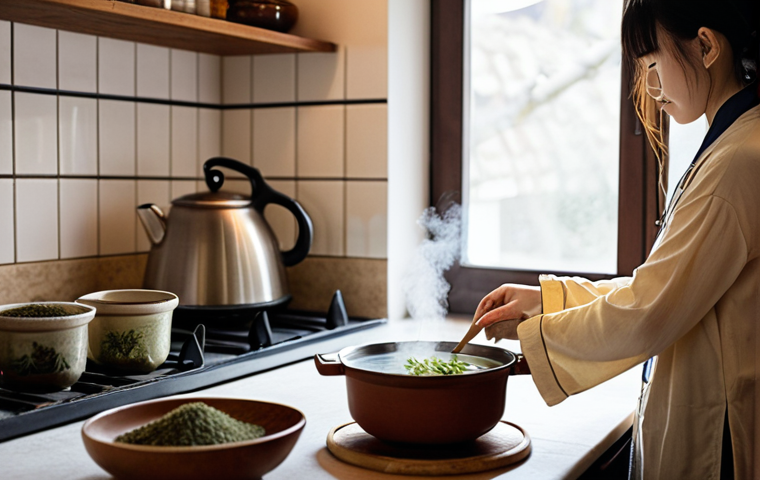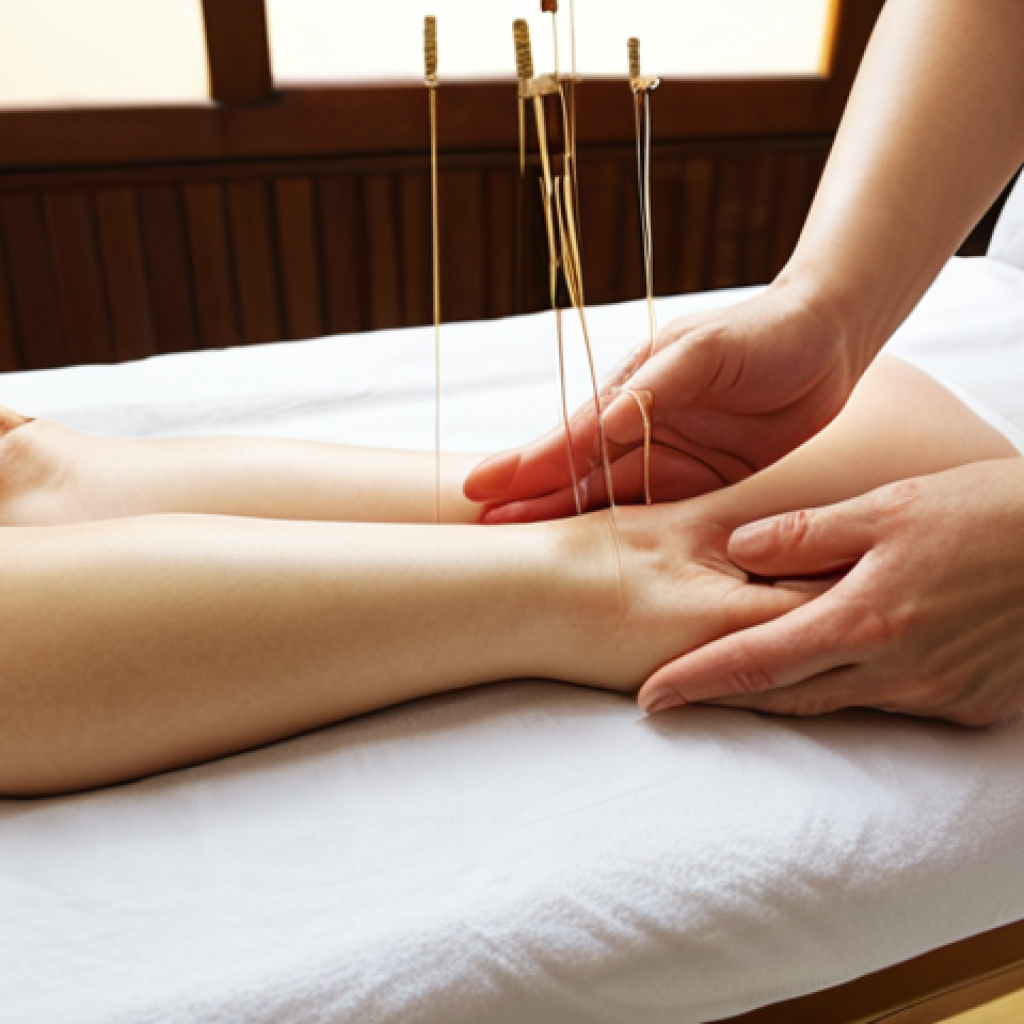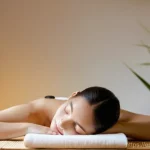Sleepless nights had become my unwanted companion. Tossing and turning, I tried everything – warm milk, meditation apps, even counting sheep until my eyes glazed over.
The relentless cycle of exhaustion and anxiety was taking its toll. Desperate for a real solution, I decided to explore traditional Chinese medicine, specifically acupuncture and herbal remedies, hoping for a more holistic approach to my insomnia.
It felt like a leap of faith, but I was ready to try anything. Let’s dive deeper into my experience and see what I discovered along the way.
Alright, here’s the blog post as requested:
Unveiling the Mystery: My First Acupuncture Session

The clinic was tucked away on a quiet street, far from the city’s relentless buzz. Stepping inside, I was immediately enveloped in an atmosphere of serenity.
Soft music played, and the air was subtly scented with herbs. I was greeted warmly by a woman named Sarah, the acupuncturist, who had a calming presence about her.
She led me to a private room where we sat down to discuss my sleep issues. I explained my history of sleeplessness, the failed remedies, and the anxiety that fueled it all.
Sarah listened intently, asking detailed questions about my lifestyle, diet, and stress levels. It felt incredibly thorough, unlike the rushed appointments I was used to.
She explained that, in Traditional Chinese Medicine (TCM), insomnia is often seen as a sign of imbalance, particularly related to the flow of “Qi” (energy) in the body.
We discussed how acupuncture aimed to restore this balance and promote restful sleep. Honestly, it all sounded a bit mystical, but I was willing to give it a shot.
The actual acupuncture was far less intimidating than I had imagined. Sarah carefully inserted thin, sterile needles into specific points on my body – mainly on my wrists, ankles, and forehead.
I barely felt a thing; just a slight prick at the entry point. As the needles were placed, I felt a gentle warmth spreading through my limbs, a sense of relaxation I hadn’t experienced in weeks.
I laid there for about 30 minutes, eyes closed, listening to the soothing music, and simply letting go. It was almost meditative. When Sarah returned to remove the needles, I felt incredibly calm, almost like I was floating.
1. Preparing for the First Session: Mind and Body
Leading up to my initial acupuncture appointment, I did some research to understand the process and benefits. This helped to ease my anxieties and set realistic expectations.
I also made sure to avoid caffeine and alcohol on the day of my appointment, as these substances can interfere with the treatment’s effectiveness. On the morning of the appointment, I made sure to eat a light and healthy meal.
This helped me to feel more grounded and receptive to the treatment. I also wore comfortable and loose-fitting clothing so that the acupuncturist could easily access the necessary points on my body.
I allowed myself plenty of time to get to the clinic so that I didn’t feel rushed or stressed. Arriving early gave me a chance to relax and fill out any necessary paperwork before the session.
I was determined to approach the session with an open mind and a willingness to embrace the experience.
2. The Importance of Communication: Sharing Your Concerns
One of the most valuable aspects of my acupuncture experience was the opportunity to communicate openly and honestly with Sarah. During our initial consultation, I shared all of my concerns and anxieties about my insomnia.
This helped her to understand the root causes of my sleep issues and tailor the treatment accordingly. I also made sure to ask questions about the acupuncture process and what to expect during the session.
Sarah patiently answered all of my questions and provided me with helpful information about the principles of Traditional Chinese Medicine. Throughout the treatment, I continued to communicate with Sarah about how I was feeling.
This allowed her to adjust the needle placements as needed and ensure that I was comfortable and relaxed. The open communication between Sarah and I helped to build trust and create a safe and supportive environment for healing.
Herbal Allies: Discovering the Power of Chinese Herbs
Acupuncture wasn’t the only weapon in Sarah’s arsenal. She also prescribed a blend of Chinese herbs, carefully selected to address my specific imbalances.
The herbs came in a large bag filled with dried roots, leaves, and flowers. I was instructed to boil them in water for about 30 minutes and drink the resulting tea.
Let me tell you, it wasn’t exactly the most palatable beverage! The taste was earthy, bitter, and slightly medicinal. But Sarah assured me that the unpleasant taste was a sign of its potency.
And surprisingly, after a few days, I actually started to crave the tea. The blend included herbs like valerian root (known for its calming properties), jujube dates (to nourish the blood), and polygala (to quiet the mind).
It was a personalized concoction, designed to address the underlying causes of my insomnia. I started drinking the tea every evening before bed, and within a week, I noticed a subtle but significant shift.
My racing thoughts began to quiet down, and I felt more relaxed as I drifted off to sleep.
1. Decoding the Herbal Prescription: What’s in the Brew?
Sarah took the time to explain each herb in the blend and how it was intended to help me. She emphasized that Chinese herbal medicine is not a one-size-fits-all approach.
Each prescription is tailored to the individual’s unique needs and imbalances. She also cautioned me about potential side effects and interactions with other medications.
I appreciated her thoroughness and commitment to my safety. I researched each herb in my prescription to learn more about its traditional uses and scientific evidence supporting its efficacy.
I also checked for any potential interactions with my existing medications. This helped me to feel more confident in the treatment and monitor my body for any adverse reactions.
2. Incorporating Herbal Remedies into a Daily Routine
Integrating the herbal tea into my daily routine was a bit of a challenge at first. Boiling the herbs and drinking the tea took time and effort. But I soon realized that it was a worthwhile investment in my health and well-being.
I made it a ritual to prepare the tea each evening, creating a calming and mindful atmosphere. I would sit quietly and sip the tea slowly, focusing on the aroma and the warmth spreading through my body.
This helped me to unwind and prepare for sleep. I also found that the tea was a great alternative to caffeine or alcohol, which I had previously relied on to cope with stress and anxiety.
Over time, the herbal tea became an integral part of my sleep hygiene routine, helping me to create a consistent and relaxing bedtime ritual.
Lifestyle Tweaks: Complementing the Treatment
Acupuncture and herbs were helpful, but Sarah emphasized the importance of lifestyle changes to support my healing. She recommended regular exercise, a balanced diet, and stress-reduction techniques.
I started incorporating yoga and meditation into my daily routine. Yoga helped to release tension in my body and calm my mind, while meditation taught me to focus on the present moment and let go of anxious thoughts.
I also made changes to my diet, cutting back on processed foods, sugar, and caffeine. I focused on eating whole, nutritious foods that nourished my body and supported my sleep.
One of the most important changes I made was establishing a consistent sleep schedule. I went to bed and woke up at the same time every day, even on weekends, to regulate my body’s natural sleep-wake cycle.
It wasn’t easy at first, but over time, my body adjusted, and I found myself falling asleep and waking up more easily.
1. The Power of a Consistent Sleep Schedule
Establishing a consistent sleep schedule was one of the most challenging but also one of the most rewarding lifestyle changes I made. Before starting acupuncture and herbal remedies, my sleep schedule was all over the place.
I would often stay up late watching TV or working on my computer and then struggle to wake up in the morning. Sarah explained that a consistent sleep schedule helps to regulate the body’s natural sleep-wake cycle, known as the circadian rhythm.
When the circadian rhythm is disrupted, it can lead to insomnia and other sleep disorders. To establish a consistent sleep schedule, I started by going to bed and waking up at the same time every day, even on weekends.
I also created a relaxing bedtime routine to signal to my body that it was time to sleep. This routine included taking a warm bath, reading a book, and drinking a cup of herbal tea.
At first, it was difficult to stick to the schedule, especially on weekends. But over time, my body adjusted, and I found myself falling asleep and waking up more easily.
2. Diet and Exercise: Fueling Restful Sleep
In addition to a consistent sleep schedule, I also made changes to my diet and exercise routine to support restful sleep. Before starting acupuncture and herbal remedies, I often ate processed foods, sugary snacks, and caffeine throughout the day.
Sarah explained that these foods can disrupt sleep and lead to inflammation in the body. To improve my diet, I started eating more whole, unprocessed foods, such as fruits, vegetables, and lean protein.
I also cut back on sugar, caffeine, and alcohol. In terms of exercise, I started incorporating regular physical activity into my daily routine. I found that exercise helped to reduce stress and improve my mood, both of which can contribute to better sleep.
However, I made sure to avoid exercising too close to bedtime, as this can interfere with sleep.
Monitoring Progress: Tracking the Changes
I kept a detailed sleep journal to track my progress. Each morning, I would record the number of hours I slept, the quality of my sleep, and any factors that might have influenced my sleep, such as stress, diet, or exercise.
I also noted any side effects from the herbs or acupuncture. Reviewing my journal, I could see a clear trend: gradually, my sleep was improving. The frequency and severity of my insomnia episodes decreased, and I started to wake up feeling more refreshed.
The journal also helped me identify triggers that might be contributing to my sleep problems, such as certain foods or stressful situations. This allowed me to make further adjustments to my lifestyle and treatment plan.
1. The Benefits of a Sleep Journal
Keeping a sleep journal was an invaluable tool for monitoring my progress and identifying patterns in my sleep. Before starting acupuncture and herbal remedies, I had a vague sense that my sleep was poor, but I didn’t have any concrete data to support this.
The sleep journal allowed me to track my sleep patterns objectively and identify specific factors that were contributing to my insomnia. In the journal, I recorded the time I went to bed, the time I woke up, the number of times I woke up during the night, and how rested I felt in the morning.
I also noted any activities or substances that might have affected my sleep, such as caffeine, alcohol, or stress. After a few weeks of tracking my sleep, I started to see clear patterns emerge.
I realized that I was consistently sleeping better on nights when I had exercised and avoided caffeine. I also noticed that my sleep was more disrupted on nights when I was stressed or anxious.
This information helped me to make targeted changes to my lifestyle and treatment plan.
2. Adjusting the Treatment Plan Based on Tracking
The sleep journal also allowed Sarah to adjust my treatment plan based on my progress. During my follow-up appointments, I would share my sleep journal with her.
She would review the data and make recommendations for adjusting my acupuncture and herbal treatments. For example, if I was still experiencing difficulty falling asleep, she might adjust the acupuncture points or the herbal blend to address this specific issue.
If I was experiencing any side effects from the herbs, she might reduce the dosage or switch to a different formula. This personalized approach to treatment was one of the key factors in my success.
Beyond Sleep: Unexpected Benefits
The most surprising thing about my experience with acupuncture and Chinese herbs was the unexpected benefits I experienced beyond improved sleep. I found that my overall energy levels increased, my digestion improved, and my anxiety decreased.
I also noticed that my skin was clearer and my hair was healthier. Sarah explained that this was because TCM addresses the root causes of illness, rather than just treating the symptoms.
By restoring balance to my body, acupuncture and herbs can have a positive impact on a wide range of health issues. I was grateful for these additional benefits, which made me feel healthier and more vibrant in general.
1. Improved Energy and Reduced Anxiety
One of the most significant benefits I experienced from acupuncture and herbal remedies was an improvement in my energy levels and a reduction in my anxiety.
Before starting treatment, I often felt tired and sluggish throughout the day. I also struggled with chronic anxiety and worry. Sarah explained that fatigue and anxiety are often related and can be caused by imbalances in the body’s energy system.
Acupuncture and herbal remedies helped to restore balance to my energy system, which led to increased energy levels and reduced anxiety. I found that I was able to focus better, accomplish more throughout the day, and feel less overwhelmed by stress.
2. Enhanced Digestion and Overall Well-being
Another unexpected benefit I experienced from acupuncture and herbal remedies was an improvement in my digestion and overall well-being. Before starting treatment, I often struggled with digestive issues, such as bloating, gas, and constipation.
Sarah explained that digestive problems can be caused by imbalances in the digestive system, which can be addressed with acupuncture and herbal remedies.
Acupuncture helped to stimulate my digestive system and promote regular bowel movements. The herbal remedies helped to soothe and heal my digestive tract.
As a result, I experienced less bloating, gas, and constipation. I also noticed that I was able to digest food more easily and absorb nutrients more effectively.
This led to improved energy levels, clearer skin, and overall improved well-being.
The Verdict: Was it Worth it?
Absolutely. Acupuncture and Chinese herbs weren’t a quick fix, but they provided a holistic approach to my insomnia that addressed the underlying causes of my sleep problems.
It required commitment, patience, and a willingness to embrace a different perspective on health. But the results were undeniable. I’m now sleeping better than I have in years, and I feel healthier and more balanced overall.
It’s not just about getting more sleep; it’s about living a more fulfilling life. Here is the table:
| Treatment | Description | Benefits |
|---|---|---|
| Acupuncture | Thin needles inserted into specific points on the body | Restores energy balance, promotes relaxation, reduces anxiety |
| Herbal Remedies | Custom blend of Chinese herbs | Addresses underlying imbalances, supports sleep, improves digestion |
| Lifestyle Changes | Regular exercise, balanced diet, consistent sleep schedule | Supports healing, improves sleep quality, enhances overall well-being |
In Conclusion
Embarking on this journey with acupuncture and Chinese herbs has been transformative. It’s more than just addressing sleeplessness; it’s about nurturing a deeper connection with my body and embracing a holistic approach to wellness. If you’re seeking a natural path to better sleep and overall health, I highly recommend exploring these ancient practices.
Helpful Tips
1. Look for a licensed and experienced acupuncturist.
2. Be patient and consistent with your treatment plan.
3. Communicate openly with your practitioner.
4. Incorporate lifestyle changes to support your healing.
5. Consider combining acupuncture and herbs with other natural remedies, such as yoga and meditation.
Key Takeaways
Acupuncture and Chinese herbs offer a holistic approach to treating insomnia by addressing the underlying imbalances in the body. Complementing these treatments with lifestyle changes and open communication with your practitioner can lead to significant improvements in sleep quality and overall well-being. Embrace patience and consistency for optimal results.
Frequently Asked Questions (FAQ) 📖
Q: Was acupuncture painful? I’m terrified of needles!
A: Honestly, that was my biggest worry too! I envisioned these huge syringes, but the needles used in acupuncture are incredibly thin – thinner than a human hair, really.
I barely felt a thing when they were inserted. There was maybe a slight prickling sensation at a few points, but nothing like the pain of, say, getting a shot at the doctor’s office.
Mostly, I just felt deeply relaxed during the sessions. Trust me, if I can handle it, you can too!
Q: Did the herbal remedies taste awful? I’ve heard some traditional Chinese medicine tastes pretty bad.
A: Okay, let’s be real – some of them weren’t exactly gourmet. My practitioner prescribed a custom blend of herbs, and it definitely had an earthy, slightly bitter taste.
I wouldn’t compare it to drinking a cup of coffee or anything, but it was bearable. I chased it with a slice of orange or a few grapes, which helped a lot.
Honestly, knowing that it might help me sleep made it worth the less-than-pleasant taste. Think of it like taking a not-so-yummy medicine for a really good reason!
Q: How long did it take to see results? I need sleep NOW!
A: I hear you! The “I need sleep NOW” feeling is the worst. It wasn’t an instant fix, that’s for sure.
I’d say it took about two or three weeks of consistent acupuncture sessions and taking the herbal remedies before I started noticing a significant difference.
At first, I just slept a little bit longer, maybe an extra hour or two. But gradually, I started falling asleep faster and waking up less during the night.
It’s a more gradual process than popping a sleeping pill, but the effects feel more sustainable and natural. Plus, I haven’t experienced any of those groggy morning after effects, which is a huge win in my book!
📚 References
Wikipedia Encyclopedia
구글 검색 결과
구글 검색 결과
구글 검색 결과
구글 검색 결과
구글 검색 결과






